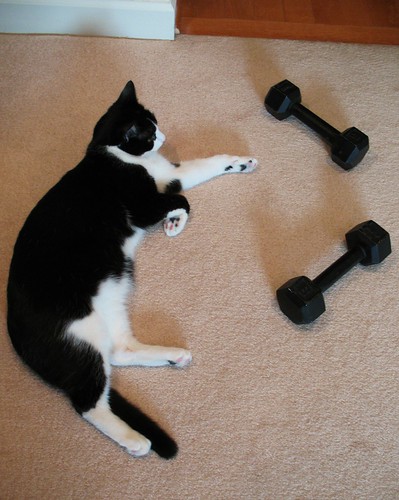Eating Right, Eating Out
Aside from my general preference for loafing instead of moving, my biggest challenge to living healthy is what happens when I eat away from my own kitchen. I am pretty good about having healthy things around and preparing my go-to nutritious meals when I am at home and following my normal routine. Things start to get out of hand, however, when I go out to eat or go on vacation and start eating what's available at family and friends' houses. Partly, I am easily caught up in the social aspect of eating and tend to eat very quickly when eating in a large group. This is true when I'm comfortably eating with family but also when I am at a party with lots of people I don't know (in that case, I am eating to have something to do when I'm not sure who to talk to). A bigger problem, though, is that when I'm not at home I find it harder to curb my impulse to eat when I'm not really hungry. Especially on vacation there are so many tempting options that I don't want to wait until I'm hungry to eat or else I'll have to pass on some of the yummy foods. So disappointing!
Normally I am just vaguely aware of the problem I have eating out and try to restrict the number of days I eat away from home. It's generally a good strategy, but there are some times when it's just not possible and I would really benefit from having some additional techniques to avoid undoing all my hard work. Now that the holiday season is upon me, it is particularly hard to avoid big social meals with lots of appealing food. Plus, the usual holiday food fest will be multiplied by a season of job interviews for my spouse which will likely have us away from home several times during the new year. So my recent goal has been to identify strategies to keep my eating to reasonable quantities while eating away from home.
Here's what I've come up with so far:
For more in this countdown series, see last week's challenge about Walking.
Normally I am just vaguely aware of the problem I have eating out and try to restrict the number of days I eat away from home. It's generally a good strategy, but there are some times when it's just not possible and I would really benefit from having some additional techniques to avoid undoing all my hard work. Now that the holiday season is upon me, it is particularly hard to avoid big social meals with lots of appealing food. Plus, the usual holiday food fest will be multiplied by a season of job interviews for my spouse which will likely have us away from home several times during the new year. So my recent goal has been to identify strategies to keep my eating to reasonable quantities while eating away from home.
Here's what I've come up with so far:
- Pay attention to hunger cues and try not to eat to the point of being uncomfortably full. I've actually succeeded pretty well on this one, even on Thanksgiving day, so that's a small victory!
- Don't eat unless I am hungry. This one has not been as much of a success--I think it is the root of my eating out/eating away problems so I want to work on it seriously over the next couple of months. Particularly as the evening progresses, I just want to eat for pleasure. Earlier in the day I find this less tempting, perhaps because there is usually stuff going on.
- Don't wait until I am starving to eat. Surprisingly, this also happens sometimes when I am eating with family or friends. Since there is a group we are not always following my own hunger cues (or an event leads us all to ignore our hunger), so when we actually do eat it is harder to make healthy decisions.
- Enjoy all the desirable foods, but don't overdo it on any one thing. Some people probably would want to change what they eat when they eat away from home, but I want to be able to enjoy all of the yummy options, especially since I know I will resume a fairly healthy and complete diet when I get back home. So, I try to incorporate healthy elements but the main thing is not to eat a ton of something really fattening and high in calories just because it is suddenly on the menu. This relates to strategies 1 and 2.
- When eating at a restaurant, hold back on bread and appetizers. I am pretty good about eating approximately half of a restaurant entree and boxing up the rest for leftovers, but sometimes this still results in my eating a huge meal if I have a lot of bread or soup or appetizers before the meal. I have recruited DH to help remind me that I don't want to overdo it on the starters just because they are there, and letting him know about this plan should also help me keep it in mind too.
- Don't give up on eating a balanced diet entirely just because I'm away from home. This is especially relevant when I will be away from home for a few days. Whenever I get into a vacation mindset, I start to just ignore nutrition and healthy food altogether. I would probably stay on track a lot more if I continued to choose healthy breakfast and lunch options even though my dinners and desserts will probably a bit less than ideal. Just because we will be going out for dinner most nights doesn't mean I also have to eat cheese danish or donuts for breakfast. I plan to incorporate this mindset for my next long weekend away from home.
For more in this countdown series, see last week's challenge about Walking.






